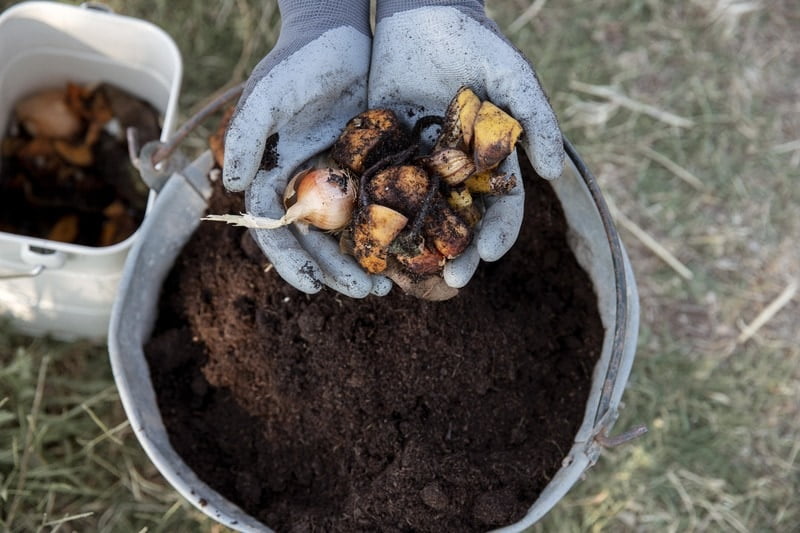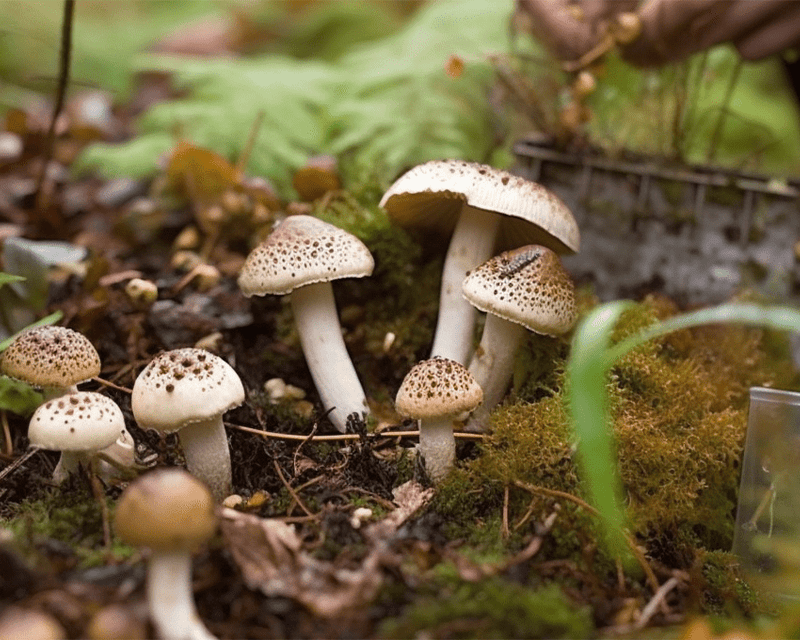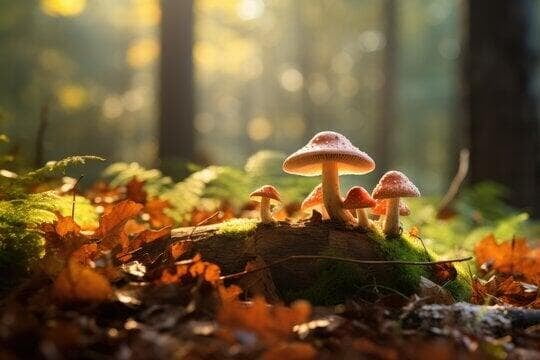Mushrooms Help Reduce Waste by Decomposing Organic Matter:
Mushrooms play a crucial role in the ecosystem by breaking down organic matter and returning nutrients to the soil. Through the process of decomposition, mushrooms help to recycle waste materials and contribute to the overall health of the environment. By breaking down dead plant material, mushrooms aid in the natural cycle of nutrient cycling, ensuring that essential elements are returned to the soil for future plant growth.
Furthermore, mushrooms have the ability to decompose a wide range of organic materials, including wood, leaves, and other plant debris. This ability to break down complex organic compounds helps to reduce the buildup of waste in the environment and promotes a more sustainable approach to managing organic waste. As mushrooms decompose organic matter, they release nutrients back into the soil, providing essential elements for plant growth and overall ecosystem health.
Mushrooms Improve Soil Health by Adding Nutrients and Enhancing Soil Structure:
Mushrooms play a vital role in enhancing soil health through their ability to add essential nutrients and improve the structure of the soil. As mushrooms grow and decompose organic matter, they release nutrients such as nitrogen, phosphorus, and potassium back into the soil. These nutrients are then made available for plants to utilize, promoting healthier and more fertile soil for sustainable agriculture.

In addition to adding nutrients, mushrooms also contribute to soil structure by forming mycelium networks. These networks act as a binding agent, helping to create stable soil aggregates that improve water retention and aeration. By enhancing soil structure, mushrooms help prevent erosion, increase the soil's ability to support plant growth, and ultimately foster a more resilient and productive agricultural ecosystem.
Mushrooms Require Less Water and Energy to Cultivate Compared to Other Crops:
Mushrooms are known for their efficient use of resources in cultivation. Unlike many other crops that require extensive amounts of water, mushrooms have a unique ability to thrive with minimal water consumption. This makes mushroom cultivation a sustainable choice, particularly in regions where water scarcity is a concern. By using less water, mushrooms help reduce the strain on water resources and contribute to overall conservation efforts.
In addition to their water efficiency, mushrooms also require less energy to cultivate compared to traditional crops. The cultivation process for mushrooms involves utilizing organic matter, such as agricultural waste or sawdust, as the substrate. This organic material serves as a natural energy source for mushroom growth, reducing the need for additional energy inputs. The energy-efficient nature of mushroom cultivation not only helps lower production costs but also lessens the environmental impact associated with energy consumption.
Mushrooms Have the Potential to Remediate Polluted Soils and Water Sources:
Mushrooms possess a unique ability to cleanse polluted soils and water sources due to their mycoremediation properties. Through their mycelium network, mushrooms can break down and absorb harmful contaminants, effectively restoring the health of the environment. This natural process of remediation not only helps to detoxify the soil and water but also promotes a sustainable and eco-friendly solution to environmental pollution issues.
By harnessing the power of mushrooms for remediation purposes, we can mitigate the detrimental effects of pollution on ecosystems and human health. The bioaccumulation and transformation capabilities of certain mushroom species make them valuable allies in the restoration of contaminated environments. As we continue to explore the potential of mycoremediation, we open up new possibilities for addressing environmental challenges and moving towards a more sustainable and regenerative future.
Mushroom Cultivation Can Help Reduce Deforestation and Habitat Destruction:

- Mushroom cultivation has emerged as a promising solution to combat the detrimental effects of deforestation and habitat destruction.
- By providing an alternative source of income for communities that rely on logging and agricultural practices that contribute to deforestation, mushroom cultivation offers a sustainable way to meet their economic needs without further damaging the environment.
- The cultivation of mushrooms also aids in the preservation of forests by reducing the demand for timber products, which in turn helps protect vital ecosystems and wildlife habitats.
- With proper management practices, mushroom cultivation can serve as a viable alternative that promotes conservation efforts and sustainable land use, ultimately leading to a healthier and more balanced coexistence between human activities and the natural world.
Mushrooms Can Serve as a Sustainable Source of Protein and Vitamins:
Mushrooms are a valuable source of essential nutrients, including protein and various vitamins. With their unique composition, mushrooms can offer a sustainable alternative to traditional protein sources like meat. This makes them an excellent option for individuals looking to diversify their diets while reducing their environmental impact.
In addition to being rich in protein, mushrooms also contain vitamins such as vitamin D, B vitamins, and antioxidants. These nutrients play a crucial role in supporting overall health and well-being. By incorporating mushrooms into your diet, you can benefit from a nutritious and sustainable food source that not only nourishes your body but also contributes to a more environmentally friendly food system.
Mushrooms Help Sequester Carbon Dioxide from the Atmosphere:
- Mushrooms play a crucial role in sequestering carbon dioxide from the atmosphere.
- As they grow, mushrooms take in carbon dioxide and convert it into biomass through photosynthesis.
- This process helps offset the carbon footprint left by human activities, contributing to the reduction of greenhouse gases in the atmosphere.
- By sequestering carbon dioxide, mushrooms help mitigate the effects of climate change and promote environmental sustainability.
- The ability of mushrooms to sequester carbon dioxide makes them a valuable tool in the fight against global warming.
- As natural carbon sinks, mushrooms assist in maintaining the carbon balance in the environment, preventing excess greenhouse gases from accumulating in the atmosphere.
- Through their unique growth patterns and metabolic processes, mushrooms actively participate in the carbon cycle, demonstrating their importance in maintaining a healthy ecosystem.
Mushrooms Can Be Grown in Controlled Environments, Minimizing Pesticide Use:
Mushrooms can thrive in controlled environments, such as indoor grow rooms or greenhouses, where conditions like temperature, humidity, and lighting are carefully regulated. This allows for optimal growth and helps to minimize the need for pesticides, as the risk of pests and diseases is reduced in these controlled settings. By closely monitoring the growing conditions, growers can prevent issues that commonly arise in outdoor cultivation, resulting in healthier mushrooms without the reliance on chemical pest control methods.

In addition to reducing pesticide use, growing mushrooms in controlled environments also enables producers to maintain a consistent supply of high-quality mushrooms year-round. This steady production schedule can help meet consumer demand for fresh mushrooms while ensuring a more sustainable growing process. By implementing innovative techniques and technologies in these controlled environments, growers can further minimize the environmental impact of mushroom cultivation and contribute to a more eco-friendly agricultural industry.
Mushrooms Support Biodiversity by Providing Habitats for Insects and Microorganisms:

Mushrooms play a crucial role in supporting biodiversity within ecosystems by providing habitats for a diverse range of insects and microorganisms. Due to their unique ability to break down organic matter, mushrooms create environments that are conducive for the growth and development of various species. Insects such as beetles, ants, and flies are drawn to the decomposing organic material that mushrooms thrive on, while microorganisms like bacteria and fungi find ideal conditions for their proliferation in the presence of mushrooms.
The intricate network of mycelium that mushrooms produce underground not only aids in nutrient cycling but also offers shelter and sustenance for a multitude of organisms. This symbiotic relationship between mushrooms and insects, as well as microorganisms, contributes to the overall health and resilience of ecosystems. By fostering a diverse array of life forms, mushrooms help maintain a delicate balance within natural habitats, promoting stability and sustainability in the long term.


